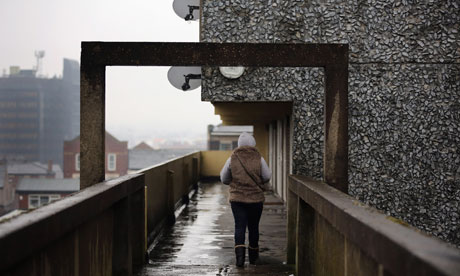‘People confronting universal credit’s obstacles may join the half who find themselves propelled to local food banks.’ Photograph: Oli Scarff/AFP/Getty Images
Millions of people are about to discover something they didn’t know about British life. There is no longer a safety net. People who have paid tax and national insurance for years and never been near the social security system will be turning to it in their hour of need; yet far too late, like trapeze artists falling through the air, they will find that the net beneath them has been lowered dangerously close to the ground and is badly torn.
If these people once believed relentlessly misleading tabloid tales of benefit scroungers, they will have a rude awakening. They will find that when Iain Duncan Smith turned the screw on social security in 2012, he was right to warn claimants: “This is not an easy life any more, chum.” As if it ever was.
The chancellor, Rishi Sunak, has done well to honour 80% of wages for those “furloughed” from shut-down businesses – up to £2,500 a month. No one knows how many that covers and at what cost, but it was a macroeconomic necessity. One worry is the incapacity of the HMRC workforce, with 15,600 staff cut and 157 local offices with local knowledge closed: can they pay the wage subsidy to companies in time to save them? Many firms could still close, sending millions into unemployment.
The 15% self-employed are urgently seeking a matching plan, with the Treasury under intense pressure for a rapid response. Most of the self-employed are low-paid: their median income is just £10,000, according to Paul Johnson of the Institute for Fiscal Studies. Some won’t qualify, if they have earning partners. But many will have been forced into sham “self-employment” by tax-cheating companies. They will be desperate – and angry. The Resolution Foundation wants them paid 80% of average earnings over the past three years – or they will work through illness, rather than starve on £94 a week sickness benefit, says the RSA Populus poll.
Let’s hope that injustice is fixed. But even then, watch the shock as millions fall on the untender mercies of the Department for Work and Pensions, to discover what happened to benefits in the past decade. While never over-generous, by 2010 Labour had greatly lifted living standards for low earners, especially for children: Gordon Brown’s tax credits raised a million children and a million pensioners out of poverty. Since 2010, according to new research by Kerris Cooper and John Hills, a professor at the London School of Economics, children have lost a quarter of the support they had; chancellor George Osborne and his successors took out a staggering nearly £40bn from benefits. Never “all in this together”, Osborne justified it by raining down abuse on low-paid families. The hypocrisy: as the current editor of the London Evening Standard, he ran Christmas collections for poor families! The Resolution Foundation predicts a third of children falling into poverty by 2023.
Some cuts were secretive, uprating benefits by a meaner CPI not RPI inflation rate, a four-year freeze, and axing council tax support. Some made a noise – such as the bedroom tax, costing some families £14 week for a spare room. An early case was a Hartlepool family whose empty room belonged to their recently deceased 10-year-old. Housing benefit for renters was cut brutally. Introducing the two-child limit was exceptionally unjust.
New claimants confronting universal credit’s obstacles may join the half who find themselves propelled to food banks. Many new arrivals will join the 60% of claimants falling into debt and rent arrears while waiting at least five weeks for first payments. As with HMRC, a stripped-down DWP workforce is at risk of being overwhelmed. Some talking to the Treasury are shocked to find its staff clueless about the meanness of a benefits system they have cut and cut again. That explains Sunak’s sudden extra £20 a week and slight easing of housing benefit: they had no idea.
Torsten Bell, head of the Resolution Foundation, says people on £50,000 salaries have been anxiously asking him about benefits rates. They’re in for a shock, he says. Unlike the previous tax credit system, universal credit only allows savings of £6,000 (it takes steep deductions from savings up to £16,000). People hoping this is only temporary will be distraught at having to use up their rainy-day funds, often saved for years for a deposit on a home. The foundation is lobbying urgently to have this savings means-test dropped.
Hills says a couple with two children will get £266 a week. And take from that £115 – the average amount that housing benefit falls short of rental payments. Many new claimants will run up rent arrears. Expect them to plunge immediately into poverty, miles below the £384 minimum income standard for a family of four, says Hills.
Some singles will get a shock too. Under-35s will be living on £73, and only funded for a room in a shared flat, in the cheapest third of rentals in the area.
Many who see themselves as middle class will confront the reality of Britain’s nonexistent safety net. It is, says the IFS’s Paul Johnson, “extraordinarily low”. One piece of advice from all these experts I’ve talked to: apply immediately, to limit these delays and debts. “Too many will wait, borrow from family, deny it’s happening to them, feeling the stigma. Apply at once,” says Torsten Bell.
These millions discovering DWP brutality at first hand will no longer be deceived by the old poison shaming those on benefits as loafers, frauds and “not people like us”. Benefits offer penury, not a life of Riley. Rishi Sunak has been lavishly praised, not least for his empathic language: “We will be judged by our capacity for compassion”. But his compassion will be judged by how far he keeps benefit rates below the most basic poverty line.
Millions of people are about to discover something they didn’t know about British life. There is no longer a safety net. People who have paid tax and national insurance for years and never been near the social security system will be turning to it in their hour of need; yet far too late, like trapeze artists falling through the air, they will find that the net beneath them has been lowered dangerously close to the ground and is badly torn.
If these people once believed relentlessly misleading tabloid tales of benefit scroungers, they will have a rude awakening. They will find that when Iain Duncan Smith turned the screw on social security in 2012, he was right to warn claimants: “This is not an easy life any more, chum.” As if it ever was.
The chancellor, Rishi Sunak, has done well to honour 80% of wages for those “furloughed” from shut-down businesses – up to £2,500 a month. No one knows how many that covers and at what cost, but it was a macroeconomic necessity. One worry is the incapacity of the HMRC workforce, with 15,600 staff cut and 157 local offices with local knowledge closed: can they pay the wage subsidy to companies in time to save them? Many firms could still close, sending millions into unemployment.
The 15% self-employed are urgently seeking a matching plan, with the Treasury under intense pressure for a rapid response. Most of the self-employed are low-paid: their median income is just £10,000, according to Paul Johnson of the Institute for Fiscal Studies. Some won’t qualify, if they have earning partners. But many will have been forced into sham “self-employment” by tax-cheating companies. They will be desperate – and angry. The Resolution Foundation wants them paid 80% of average earnings over the past three years – or they will work through illness, rather than starve on £94 a week sickness benefit, says the RSA Populus poll.
Let’s hope that injustice is fixed. But even then, watch the shock as millions fall on the untender mercies of the Department for Work and Pensions, to discover what happened to benefits in the past decade. While never over-generous, by 2010 Labour had greatly lifted living standards for low earners, especially for children: Gordon Brown’s tax credits raised a million children and a million pensioners out of poverty. Since 2010, according to new research by Kerris Cooper and John Hills, a professor at the London School of Economics, children have lost a quarter of the support they had; chancellor George Osborne and his successors took out a staggering nearly £40bn from benefits. Never “all in this together”, Osborne justified it by raining down abuse on low-paid families. The hypocrisy: as the current editor of the London Evening Standard, he ran Christmas collections for poor families! The Resolution Foundation predicts a third of children falling into poverty by 2023.
Some cuts were secretive, uprating benefits by a meaner CPI not RPI inflation rate, a four-year freeze, and axing council tax support. Some made a noise – such as the bedroom tax, costing some families £14 week for a spare room. An early case was a Hartlepool family whose empty room belonged to their recently deceased 10-year-old. Housing benefit for renters was cut brutally. Introducing the two-child limit was exceptionally unjust.
New claimants confronting universal credit’s obstacles may join the half who find themselves propelled to food banks. Many new arrivals will join the 60% of claimants falling into debt and rent arrears while waiting at least five weeks for first payments. As with HMRC, a stripped-down DWP workforce is at risk of being overwhelmed. Some talking to the Treasury are shocked to find its staff clueless about the meanness of a benefits system they have cut and cut again. That explains Sunak’s sudden extra £20 a week and slight easing of housing benefit: they had no idea.
Torsten Bell, head of the Resolution Foundation, says people on £50,000 salaries have been anxiously asking him about benefits rates. They’re in for a shock, he says. Unlike the previous tax credit system, universal credit only allows savings of £6,000 (it takes steep deductions from savings up to £16,000). People hoping this is only temporary will be distraught at having to use up their rainy-day funds, often saved for years for a deposit on a home. The foundation is lobbying urgently to have this savings means-test dropped.
Hills says a couple with two children will get £266 a week. And take from that £115 – the average amount that housing benefit falls short of rental payments. Many new claimants will run up rent arrears. Expect them to plunge immediately into poverty, miles below the £384 minimum income standard for a family of four, says Hills.
Some singles will get a shock too. Under-35s will be living on £73, and only funded for a room in a shared flat, in the cheapest third of rentals in the area.
Many who see themselves as middle class will confront the reality of Britain’s nonexistent safety net. It is, says the IFS’s Paul Johnson, “extraordinarily low”. One piece of advice from all these experts I’ve talked to: apply immediately, to limit these delays and debts. “Too many will wait, borrow from family, deny it’s happening to them, feeling the stigma. Apply at once,” says Torsten Bell.
These millions discovering DWP brutality at first hand will no longer be deceived by the old poison shaming those on benefits as loafers, frauds and “not people like us”. Benefits offer penury, not a life of Riley. Rishi Sunak has been lavishly praised, not least for his empathic language: “We will be judged by our capacity for compassion”. But his compassion will be judged by how far he keeps benefit rates below the most basic poverty line.







